During the pandemic, when I was between treadmills and fitness centers were closed, I did my daily five-mile walks under starry skies in pre-dawn darkness. With no TV to watch, I passed the time praying.
I petitioned God to save the Hood County News.
The newspaper in our idyllic lake community 35 miles southwest of Fort Worth had been slowly dying for years, and the COVID-19 pandemic seemed poised to finish the job. The U.S. Census Bureau had deemed us the ninth fastest-growing county in the country based on growth that occurred between July 1, 2017, and July 1, 2018, yet the 100-year-old institution — which had evolved from a paper whose editor was the grandson of Alamo hero Davy Crockett — all but had a tag on its toe.
There were reasons, and some would say I was one of them. Covering elections and local government is a tough gig here.
I wanted my few remaining co-workers and I to stay employed in our little corner of the world in Granbury, but there were other, more important reasons for my appeals to God.
Newspapers play an important role in our democracy, and, in case you’ve been in a coma, ours is in peril. Community watchdogs are dying off at a time when our republic is under attack from within. When newspapers die, corruption goes unchecked, taxes go up, and voter participation goes down.
Roughly 1,800 newspapers in this country have closed since 2004, and about 1,700 of them were weeklies in small communities, according to an autopsy of the industry performed by Penny Abernathy, a professor at the University of North Carolina’s Hussman School of Journalism and Media. Her research showed that closures have occurred at a pace of about 100 per year, and some of those newspapers were the only source of news in their communities. Some papers were family-owned, and some had been in business for more than a century.
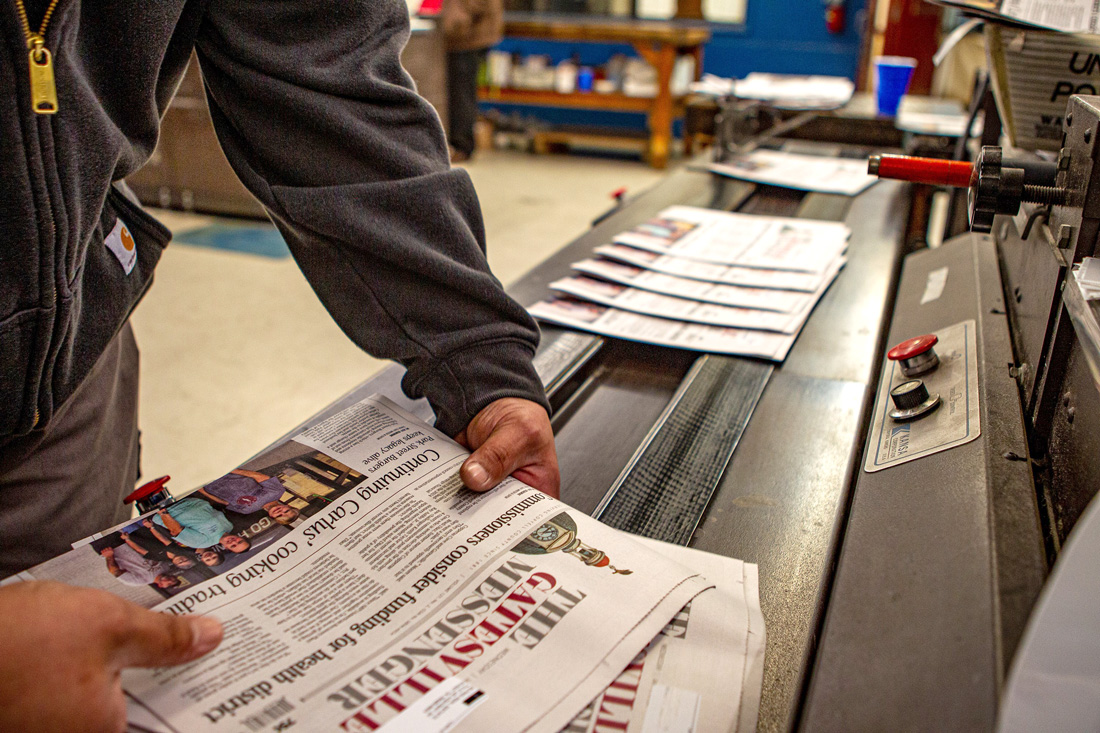
Photo courtesy of David Montesino
When a small daily or weekly newspaper closes, Abernathy told Poynter last October, “you lose the journalist who was gonna show up at your school board meeting, your planning board meeting, your county commissioner meeting.”
Advertisements have been the lifeblood of newspapers, but the rise of social media left advertisers less reliant on print ads.
Finding a way to adapt and raise revenue in other ways became crucial for survival, and many newspapers didn’t meet the challenge. As a result, the country became a graveyard for papers that had once informed readers about local issues that impacted them and served as their community’s scrapbook, chronicling births, deaths, sports wins, graduations, marriages, and the big fish that didn’t get away.
Hedge funds purchased a slew of newspapers, then gutted their newsrooms and filled their pages with wire service stories and press releases. Reporters and editors who were invested in their communities and who had historical knowledge of those communities were sacrificed by those who wanted to make a fast buck.
The result was the formation of news deserts.
The void became even more perilous when larger dailies that had once assigned reporters to cover smaller towns in their coverage area could no longer do so because their own newsrooms had been slashed. Among those let go were investigative reporters who had won Pulitzer Prizes and other major awards for exposing government waste and corruption, grave injustices, and environmental issues that affected public health and safety. Publishers who had once felt pride in those awards traded future honors for cheaper labor.
At the HCN, staff diminished over a period of years through layoffs and attrition. Advertising and subscriptions declined year over year. Cost-cutting measures lowered the quality of our twice-weekly product, making it less appealing and harder to sell. This resulted in the need for more cost-cutting measures, which lowered the quality of our product even more. It was the proverbial vicious cycle.
One day, instead of parking in the spot I had been assigned upon my arrival at HCN in November 2007, I pulled up to the gate leading to our side courtyard, where there is a door. I didn’t bother to ask permission, and no one challenged it. What would have been the point? Our parking lot had become a waste of valuable real estate.
In February 2018, we lost Mary Vinson. Although she had been the paper’s staff photographer and a beloved community liaison since January 2001, she was tossed out of the lifeboat amid another round of layoffs.
Funny, the number of nautical references that applied. A sinking ship and all that.
After Mary was let go, a former colleague, referring to the HCN’s seeming inability to save itself, posted on Facebook a line from Gordon Lightfoot’s ballad “The Wreck of the Edmund Fitzgerald.”
“At 7 p.m. a main hatchway caved in.”
In other words, it was just a matter of time.
Those of us on staff knew we were on the Titanic/Edmund Fitzgerald with no ability to alter our course.
In March 2020, COVID-19 hit, and businesses deemed “nonessential” were ordered temporarily closed. Newspapers were considered essential, so we were able to stay open. However, businesses that were closed had no need to advertise and no money to advertise with.
On Tuesday, March 31, 2020, our longtime publisher, Jerry Tidwell, who owned the paper along with the Roberts Publishing Group and other shareholders, sent an email announcing that there would be a staff meeting after we went to press that morning with Wednesday’s issue.
Guessing what the topic was going to be wasn’t hard, especially since Jerry’s son, our general manager, kept carrying items from his office to his car, using the side door by my cubicle.
The main hatchway officially caved in, not at 7 p.m. but around 11 a.m., when our diminished staff gathered around Jerry between my cubicle and the kitchen.
The editor and I would be the only ones left on the editorial staff. Blake Roberts, vice president of the Roberts Publishing Group, was driving in from West Texas to take control, and Jerry himself might soon be gone.
Jerry said he had advised the board to shut the newspaper’s doors. Its members had refused.
I was angered by Jerry’s recommendation, and thankful that the board had refused to give up on a newspaper in one of the fastest-growing counties in the country, even though I figured their reasons were probably financial and not based on principle or a commitment to journalism.
Jerry retired. He continued trying to find a buyer for both the paper and the real estate, though. He rang up local attorney Paul Hyde, whose law firm was growing and needed more space. At first Paul thought the conversation was just about him buying the building, then he realized that Jerry wanted him to buy the paper, too.
Hell, no.
Paul’s friends had the same reaction. Newspapers are a dying industry, they told him, as if the choir needed to hear some preaching.
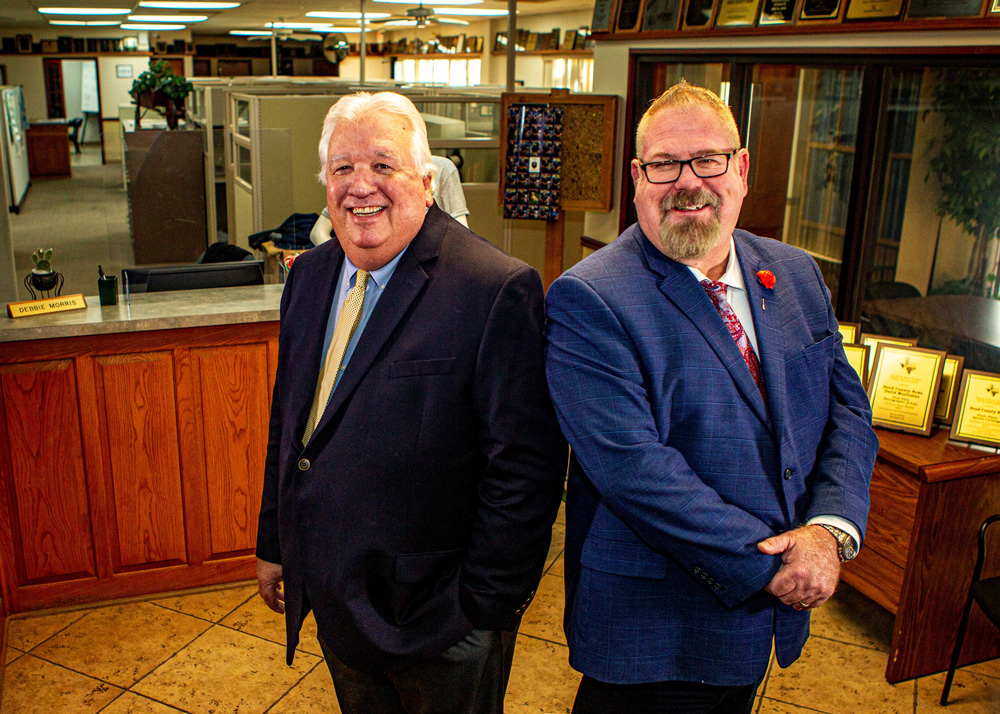
Photo courtesy of David Montesino
Jerry and Paul kept talking, though, and eventually Paul started to soften. His hard no became a hard maybe. He started thinking about the HCN’s legacy and about the treasures buried within its archives, like the picture of himself at age 3, overcome with joy after receiving the gift of a stuffed Santa at the Peppermint House day care center.
The building on West Pearl Street that was once the site of the Peppermint House is now the headquarters for Paul’s Hyde Law Firm. He likes to joke that he occasionally still enjoys juice and cookies there for old times’ sake.
The more Paul and Jerry talked, the more Paul realized how much the HCN had been part of his life and his family’s life. His mother Beverly Hyde had even worked at the HCN for a while as a staff writer back in the day.
Paul reminisced about how he had earned a few bucks as a kid working in the HCN’s insert room, where advertising inserts are placed inside newspapers. He simply showed up one day to replace his older brother John, just as John had done when he showed up to replace another brother, James III, after the eldest boy was ready to move on.
Paul relates with amusement that Jerry interviewed only one Hyde boy: James III. He apparently assumed that James’ brothers would work just as hard as he did.
As Jerry kept trying to convince Paul to buy the HCN, the paper managed to keep stumbling along, its doors kept open through the Paycheck Protection Program (PPP) by the Small Business Administration (SBA).
At some point during all this, Paul and his friend Sam Houston made plans to meet for lunch. The two had met when Sam managed Granbury Live, an entertainment venue on the square. They immediately hit it off and became friends.
One night Paul called Sam at home to firm up plans for lunch the next day.
During that brief conversation, Paul asked, “By the way, what do you know about newspapers?”
Nothing, Sam replied, except that he had been reading newspapers every day since he was a kid.
Paul said nothing more, just that he would see Sam the next day.
Hanging up, Sam turned to his wife and said, “Paul’s buying the paper, and he wants me to run it.”
*****
Sam walked through the doors of the HCN offices on June 30, 2020 — his 64th birthday. My cubicle was in the back of the building, so I couldn’t see him. I was aware of his arrival, though, because noise travels in big empty spaces. I continued working, knowing that eventually he would come for me.
When he did, I looked up to see a 6-foot-1-inch, 295-pound bear of a man with a head of white hair, the kind of guy you might expect to have a name like Sam Houston or to shove you out of the path of an out-of-control beer truck.
At the time of his arrival at the HCN, Sam, who had led a colorful life, knew plenty about concert promotion, quarter horse breeding, and how to represent accused murderers in courtrooms, but he didn’t know spit about journalism.
He did have some definite thoughts about how to run a business. Decades earlier, the results of a college aptitude test had indicated that Sam might be suited for figuring out why struggling companies were imperiled and then teaching those companies how to fix the problem.
I think we staffers probably assumed that the sale was going to happen, but Sam knew something we didn’t: that the purchase was not at all certain. Sam told Paul that he would work for free to learn enough about the HCN to determine whether buying it would be a wise investment.
Sam showed up every day and was the first to arrive. He also came in on weekends, having been given a key and the alarm passcode, because why wouldn’t that make sense in the crazy existence we were living?
At first, Sam was loathe to take our bookkeeper Cher’s recommendation to take over Jerry’s office. He went ahead and did it. After all, there was no one to offend. Blake Roberts had been on site for only a couple of days before having to head back to his own newspaper, the Andrews County News.
Almost immediately, staffers began coming to Sam for direction on what to do about this or what to do about that. He sensed their frustration when he said that he had no authority to tell them what to do and could only offer advice. After a couple of days of this, Sam, with Paul’s approval, took charge of the operation.
“It was very clear to me five minutes in that these people were starved for leadership, starved for direction, and starved for a plan,” Sam said.
Most eye-opening for Sam was the company’s finances. With permission from Jerry, he examined the books and conferred with Cher. He quickly found where money was being wasted and where money could be made. Sam crunched numbers at the office and crunched them again at home. Even figuring conservatively, he began to think that the HCN could survive and even turn a profit.
Paul trusted Sam’s assessment and went through with the sale in August of 2020. The HCN began to turn around with astonishing speed.
Without Paul having to invest another dime, Sam brought back some of my co-workers who had been laid off, including Mary, which resulted in a lot of positive social media buzz. He even hired additional people, including Mark Wilson and Ashley Inge, the only two on-site writers at the Gannett-owned Stephenville Empire-Tribune.
“The cavalry came,” one of them said about the day Sam showed up in person to ask the pair if they would like to come work for the Hyde Media Group.
The two quit Gannett on the spot. (The Empire-Tribune was previously owned by GateHouse, which merged with Gannett under the Gannett name in late 2019, becoming the largest newspaper chain in the country. Both companies had reputations for gutting newspapers.)
In hardly any time at all, our parking lot went from looking like a ghost town to looking like what we had become: a thriving, successful business.
Sam hired a managing editor: David Montesino. We’d never had a managing editor before. Sam had big plans and knew that a managing editor would be needed.
On June 30, 2021, the first anniversary of Sam’s arrival, the HCN announced that the Hyde Media Group had become a true media “group.” It had acquired three additional newspapers: Azle News, The Gatesville Messenger, and The Springtown Epigraph.
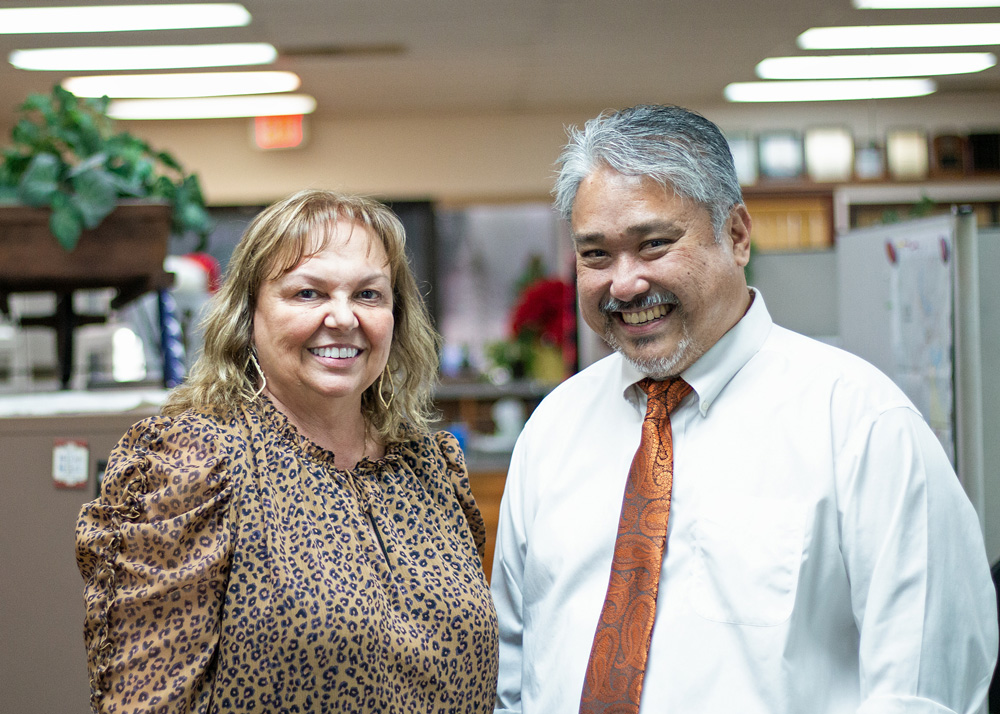
Photo courtesy of Russell Huffman
Once the flagship of the Roberts enterprise, the HCN is now the crown jewel of the Hyde Media Group and a headquarters where copy editing, page layout, web management, and ad design are being handled for all four newspapers in the cluster. Those services have freed up staffers to focus more intently on reporting the news in their communities.
We now have planning meetings, and stories are scheduled in advance for multiple issues. No more hair-on-fire scrambling.
Sam invited elected officials and others to contribute columns to the HCN. This put more voices in our paper, created goodwill among the community, and added more pages to the paper without burdening the reporting staff. There are more feature stories about interesting people in the community.
The sale of an HCN-owned van that had been sitting unused provided seed money for technology upgrades that included a new server system and phone system as well as a new, better website.
Sam’s strategy for success was the opposite of cutting corners. Instead of diminished quality, he focused on producing a quality product, put out by the best people he could find.
“I’m all about getting the best players on my team,” he said.
Large color photos shot by gifted staffers, two of whom are skilled at drone photography, began to fill the HCN’s pages and website, replacing courtesy photos shot with cell phones. A heavy focus on school sports photography was designed to appeal to proud parents and grandparents as well as supporters in the community.
The HCN now has a social media director who manages our Facebook, Twitter, and Instagram accounts and a webmaster who is also managing the new websites of the HCN’s sibling papers.
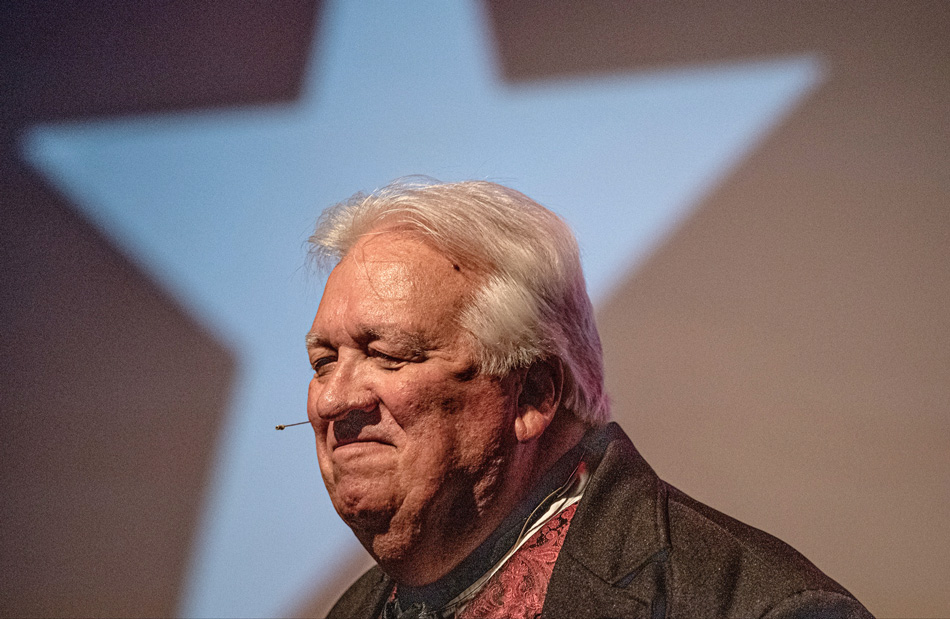
Photo courtesy of David Montesino
Sam put his own talents as a public speaker and performer to work in creating kinship and promoting the new HCN. He spoke to civic groups and other organizations, promising fair coverage, and a commitment to the community. His talks were well-received, and so are his “From My Front Porch” columns that are in every issue.
In the spring of 2021, Sam donned vintage clothing and took to the stage at the historic Granbury Opera House on the square to perform his one-man play The Lion of Texas: A Conversation with Sam Houston. The shows were to raise money for the Granbury Theatre Company, which lost about $1 million in 2020 because of the pandemic.
Sam knew I was in the audience at one of those shows and drew laughs when he good-naturedly ad-libbed a line about me. While relating that as a teen in the early 1800s Houston had disappeared into the woods to live with Indians, Sam said that these days such an occurrence would prompt an AMBER alert and maybe even a story in the Hood County News written by Kathy Cruz.
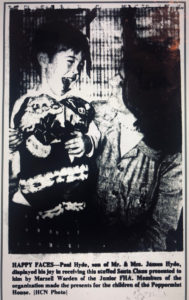
Courtesy Hood County News
As I watched him onstage, I felt as if I had traveled back in time. The feeling wasn’t because Sam was portraying the legendary American general and statesman who played an important role in the Texas Revolution. It was because the publisher of a local newspaper was doing something to help the community he loved and which his newspaper served.
It fit with Sam’s philosophy on how to restore the HCN and the community newspaper industry as a whole.
He calls it “Mayberry on steroids.”
*****
On Friday, March 29, 1991, The Oklahoman, the Sooner State’s largest daily newspaper, published an Associated Press article about an attack that had occurred the day before on a special district judge at the Stephens County Courthouse in Duncan.
The judge, Lee McIntire, 27, had been rushed to a hospital with a head injury after a man threw her against a concrete wall as she and her court reporter waited for an elevator in the building’s basement.
“A local attorney carried McIntire into the sheriff’s department, where an ambulance was called,” the AP reported.
That day marked both the first and last time that then-34-year-old Sam Houston wore the most expensive suit he had ever owned.
The young attorney had arrived at the courthouse for a 1 p.m. court hearing, parking in the back and entering through the basement where there was a snack bar. He stopped at a vending machine for a pack of gum and greeted the judge as she walked past.
Sam noticed that a man seemed to be following her and her court reporter.
“It seemed to me that his pace was picking up and the elevator doors weren’t open, so there wasn’t any reason to be running towards the elevator,” Sam told me. “So, I dropped my briefcase and started running towards her because it just didn’t smell right. And when I got halfway there, he put his arm around her throat and she went flying against the concrete wall, and immediately there was blood everywhere. I thought he had slit her throat.”
The court reporter was eight months pregnant, and Sam feared that she was next.
Assuming the man had a knife, Sam figured that if he could pin the man’s arms, his own arms might get cut up a bit, but the man wouldn’t be able to attack the court reporter.
As the man, Frank Edward Talton, stared at the injured judge, Sam ran up behind him and punched him in one of his kidneys, which caused his hands to drop. Sam then grabbed Talton in a bear hug and yelled at the court reporter to get help from the sheriff’s office, which was just feet away.
When several deputies came running, Sam released his grip. Talton ran and was captured in the parking lot. While the deputies took him into custody, Sam scooped McIntire into his arms and carried her to the sheriff’s office, where an ambulance was called. Only later did he realize that his new suit was stained with her blood.
Fortunately for McIntire, her throat had not been slit.
The gush of blood was due to her head wound, which required nine stitches to close. Talton, whom Sam said was found to have mental issues, was charged with assault and battery with intent to kill.
After Sam told me that story during one of the long talks we had after he first arrived at the HCN, I started to think that maybe my first impression of him had been accurate and that maybe he really could be trusted.
Sam does seem focused on shoving us out of the way of out-of-control beer trucks or those who would do us harm. For months after we began publishing under our new ownership, Democrats and Republicans alike believed that I had been muzzled. I haven’t. We’re just not taking on everything that comes along as if it is our duty to do so.
Sam assured me that while we may do some things differently, we would continue reporting the news. He has kept his word.
We did not let the threat of political backlash keep us from reporting on the bullying of our elections administrator, who ended up resigning in November. She was the second elections administrator to leave after being targeted by a political faction despite receiving praise from the state for her handling of elections. That situation made national news.
And a few months ago, we reported on a constable whom members of the Commissioners Court said they hadn’t seen since January 2021, even though he was continuing to draw a paycheck from the county. Documents that I obtained through open records requests proved that his work output had gone down considerably during those months when the county judge and commissioners said he was missing in action.
There are some things we held back on that we probably would have reported on in the old days, like the candidate in a Granbury special election who threatened to sue the city and another candidate over a residency issue.
The man followed through on that threat. However, his lawyer filed the lawsuit in the wrong court. Even though we had a copy of the lawsuit, a copy of the demand letter sent to the city, and the city attorney’s response to that demand letter, we waited to see if the lawsuit would be refiled with the proper court. It wasn’t. Therefore, no story.
And here is another difference between the old HCN and the new one: We are not publishing voters guides containing Q&As with candidates, at least not for now.
During the last few election cycles under our previous ownership, a few candidates got the bright idea of using the free space we gave them to insult us. When we added a rule to prevent that from happening again and then refused to publish the responses of two candidates who broke that rule, one submitted revised answers. The other one took to social media to claim that we had censored him.
At the new HCN, we are happy to sell ad space to candidates and pretty much leave it at that.
No more getting flattened by a beer truck.
*****
The fictional town of Mayberry was made famous by The Andy Griffith Show in the 1960s. In the decades since, the town’s name has become synonymous with innocence and simpler times.
That innocence and simplicity no longer exist, yet the need to feel part of something, to belong somewhere, still lives within us. Sam’s “Mayberry on steroids” strategy is working. It’s drawing readers back into the fold of their community newspaper.
The HCN closed out 2021, another COVID-19 year, with a 12%-13% increase in display advertising revenue and a rise in print jobs for our web press of about 35% over what they had been in pre-pandemic 2019. Subscriptions are increasing at a rate of about 2% every month, even with the number of subscribers we lose through deaths and relocations.
Since Sam first arrived in June 2020, he has added 15 full-time employees to the HCN’s payroll and many part-timers. Among the four newspapers, the Hyde Media Group employs about 60 people. There is racial diversity, and people with physical challenges have been hired.
The HCN has an intern, a Tarleton University student named Triston McGehee who is being groomed for a full-time staff position with the Gatesville paper. Sam is determined that we will mentor more Tristons and that the Hyde Media Group will give students like him the best training possible for a career in journalism.
Sam has even bigger plans than those he has already brought to fruition. He and Paul have made it clear that the Hyde Media Group is not done acquiring papers. Both have fielded calls from publishers asking if they might be interested in buying their newspaper. For now, though, the Hyde Media Group will remain a four-newspaper operation because Paul and Sam are being cautious and deliberate with the media company’s growth.
At the HCN’s lowest point, the paper was just eight pages. It is now regularly 18-22 pages. Sam plans to up that to 24-28 per issue. The aim for the other papers is for them to routinely be 16 pages and, as Sam says, “all color, all the time.”
Whereas the “old” HCN focused on those over 50, Sam intends to keep reaching out to younger audiences, offering them such tips as fun things they can do with their kids during Christmas break. For the next school year, he has a plan that he believes will increase the HCN’s subscribers while helping parents fundraise for their kids’ school clubs and organizations.
With both Granbury and Cresson exploding in growth, Sam views every planned housing development as that many more subscribers. As for the additional retail that’s coming, that means more advertisers who will benefit from the HCN’s plan to soon start embedding ads and ad-related videos in online news articles. The viewership of those news articles is on the rise.
The month of December brought a 30% spike in engagement on the HCN’s Facebook page, where posts contain links that drive viewers to the newspaper’s website.
Sam expects that 2022 will bring an additional $500,000-$750,000 in display advertising among the Hyde Media Group’s four newspapers. He has vowed that when revenue streams increase the newspapers’ profits, they will be shared with employees. I have no reason to doubt him on this, having personally benefited from his generosity. He gave me my own office, the title of senior staff writer, and, after a particularly hectic news cycle that resulted in my byline on every story on Page 1, a raise.
At 65, Sam figures he maybe has 10 good years left, and he intends to spend them right here with us.
“This has taken too much of me,” he told me, in reference to this being his last career stop. “I feel a responsibility to people who work here. I have a great affection for them, and I want them to know that they have a job.”
Others may see newspapers as a dying industry, but to Sam the business is bursting with potential. He believes that the Hyde Media Group’s newspapers will still be in print 10-15 years from now, and he has every intention of pulling in younger generations who prefer to read their news online.
“I think there’s a ton of additional revenues,” he said of the industry that once relied solely on subscriptions and print ads. “We’re not operating like a friggin’ 1995 newspaper.”
Sam aspires to convince Hyde Media Group communities that their local newspaper is their source for all local news, whether that news pertains to the school bond election or a toppled sign at Burger King.
As for me, I feel that God answered my prayers in a way I never could have imagined. And I find it interesting that Sam, too, has similar thoughts about how he ended up here.
“I have sat on my porch having a glass of rum and thought about this lots of times,” he told me. “And I absolutely believe that the good Lord knew about this a long, long, long time ago, and all of the things I’ve done have brought me right here.
“Why on God’s green earth when I was a kid would I cut out Joseph Pulitzer’s quote in the Post-Dispatch and carry it in my wallet for the next 10-12 years? I mean, I never thought about being a newspaper person at all, but the skills I have in marketing, in business, the mediation, the management, the legal, I use every single day.”
The Pulitzer quote, in continuous use on the St. Louis Post-Dispatch’s editorial page since November 1911, is this: “I know that my retirement will make no difference in its cardinal principles, that it will always fight for progress and reform, never tolerate injustice or corruption, always fight demagogues of all parties, never belong to any party, always oppose privileged classes and public plunderers, never lack sympathy with the poor, always remain devoted to the public welfare, never be satisfied with merely printing news, always be drastically independent, never be afraid to attack wrong, whether by predatory plutocracy or predatory poverty.”
The only reason Sam stopped carrying that quote years ago was because he lost his wallet.
He apparently never stopped caring about newspapers, and never lost sight of how important they are. Now, as a publisher and as chief operating officer of the Hyde Media Group, roles that require him to focus on the financial bottom line, he feels that newspapers have just as much potential, if not more, than they had in the industry’s heyday.
He aims to prove it.
“We’re just getting started,” he said.



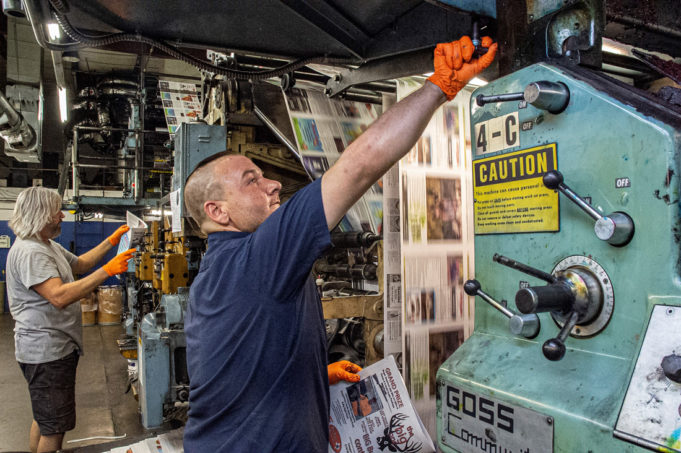









Great story! It (the HCN)does have a history. It is nice to know that it’s history w
Is recognized and will be protected and built on. Good Luck. It is certainly a beautiful and interesting newspaper.
I thoroughly enjoyed this article and learned more about the importance of local newspapers! Thank you, Kathy, for a well researched, well written article!
That’s my hunting guide Justin and Wade are working on in that first picture. That guide was a headache for all of us but it turned out OK.
Great article by the way.